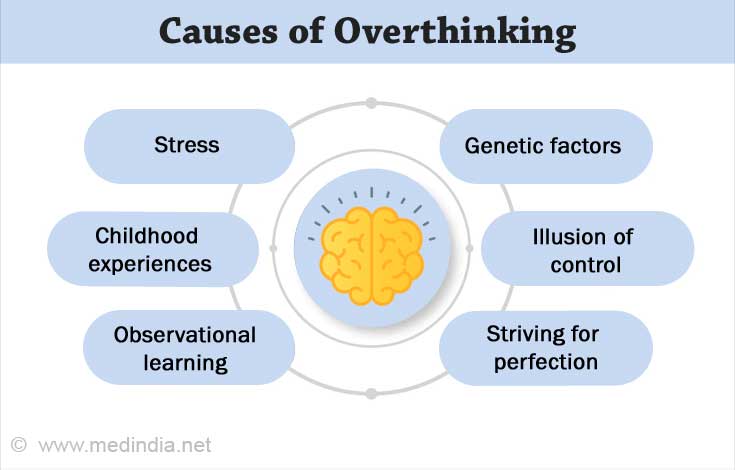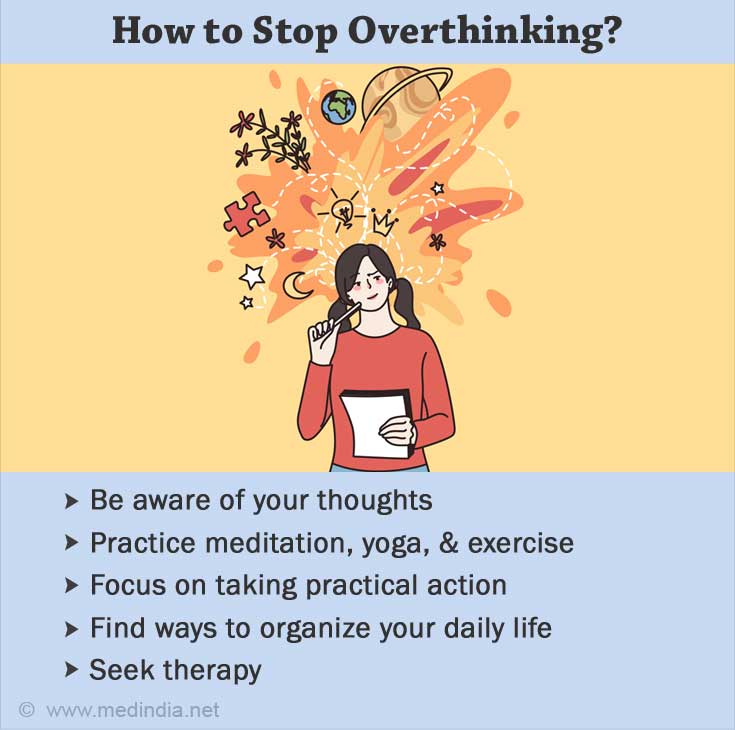- Generalized anxiety disorder - (https://www.mayoclinic.org/diseases-conditions/generalized-anxiety-disorder/symptoms-causes/syc-20360803)
- Anxiety Disorders - (https://my.clevelandclinic.org/health/diseases/9536-anxiety-disorders)
- When Overthinking becomes a Problem and what you can do About it - (https://www.houstonmethodist.org/blog/articles/2021/apr/when-overthinking-becomes-a-problem-and-what-you-can-do-about-it/)
- Somatic Symptom and Related Disorders - (https://familydoctor.org/condition/somatic-symptom-and-related-disorders/)
- How to Stop Overthinking Everything - (https://hbr.org/2021/02/how-to-stop-overthinking-everything)
What is Overthinking?
Overthinking refers to the tendency to spend high amounts of time in thought, typically thinking about something negative. These thoughts could be related to the future and its’ uncertainty, analyzing why someone behaved a certain way, self-doubt, and trying to be prepared for the worst. It could be trying to find an ideal solution for a problem or expecting oneself to be perfect. This can cause psychological problems. Overthinking and anxiety are linked.
Overthinking is likely to be harmful and does not meet its intended goals. It can be energy draining and can interfere with the lives of people. With thinking being greatly emphasized from the school years, people are trained to think, plan, and be prepared. While this has advantages at times, when it crosses a limit, it becomes disadvantageous.
What are the Causes of Overthinking?
The causes of overthinking are varied. The predominant causes include:

- Stress – When we are stressed about something, we are likely to spend a lot of time thinking about dealing with the situation.
- Childhood Experiences – Sometimes we learn to cope with difficult life situations in childhood by using thinking as a measure.
- Observational Learning – Growing up with parents who tend to overthink can lead to a child observing and imitating this tendency. For example, seeing a parent stressing about a financial situation.
- Genetic Factors – It is possible to inherit the tendency of overthinking just like other habits. Genetic factors can also predispose a person to excessive thinking, which may show up when the person is faced with difficult situations.
- Illusion of Control – From relationships, to finances, health, and future plans, we constantly aim to control the tiny details in life. It is very little control that we actually have, but we do not often realize this. This leads to excessive thinking which presents itself as a strategy, but is actually ineffective.
- Need to be Certain – We often try to know things with absolute certainty. For example, you need to know how many questions you got right in the exam so you check the answers with all your classmates. This gives an illusion of certainty in one’s mind, but actually it is impossible to be 100% certain.
- Striving for Perfection – Striving for perfection or perfectionism also leads to overthinking. There is a lot of focus on checking everything to ensure that it is without flaws. This leads to a lot of time spent thinking and attention to detail.
- Avoiding Conflict – Most people try to avoid any form of unpleasantness. To do this, we often tend to play out scenarios in our heads as to how things may go and how to adjust our behavior
- Overgeneralizing the Effectiveness of Thinking – While in an exam hall or quiz, thinking can be very helpful. But we often apply the same technique to other situations and it may be more of a hindrance than a solution. For example, thinking about what another person thinks about us.
- Secondary Gain – Thinking can have its indirect benefits too. Someone who overthinks may find themselves getting a lot of reassurance from loved ones. It could also be a form of procrastination that delays unpleasant or difficult decisions or tasks.
What are the Symptoms of Overthinking?
The symptoms of overthinking include:
- Constant worry and apprehension
- Overestimating the possibility of threat
- Difficulty in relaxing
- Automatic negative thinking or underlying negative thoughts
- Difficulty in decision making
- Feeling anxious
- Preoccupation with thoughts
- Feeling tired or drained
- Replaying negative situations in one’s mind
- Difficulty sleeping
- Intolerance of uncertainty or inability to handle uncertainty
- Dwelling on the past or future
- Focusing on things outside one’s control
Which Mental Disorders involve Overthinking?
Several mental health conditions involve excessive thinking. These include anxiety disorders such as generalized anxiety disorders, phobia, social anxiety disorder, and panic disorder. Depressive disorders are also characterized by negative overthinking, which primarily fuels the issue.
In addition to this, somatic symptoms and related disorders can also involve overthinking about health issues. Obsessive Compulsive Disorder is another condition in which obsessive thoughts and overthinking are at the peak. Eating disorders such as anorexia nervosa can also lead to excessive thinking about body image.
How to Stop Overthinking?

There are several ways in which overthinking can be managed or stopped. One of the most important factors is the awareness of our thoughts. When we are aware of our destructive thoughts, we can choose not to take them seriously. Mindfulness practices like meditation, yoga, or even exercise for relaxation can help. Journaling or noting down thoughts can also be beneficial in improving awareness.
Focusing on taking practical action instead, or thinking can also help curb unnecessary thinking greatly. Looking at the situation for what it is objectively can help in this regard. Managing perfectionism can also be very helpful. It is impossible to be perfect and pushing ourselves towards this is self-defeating. Therefore, accepting that an ideal scenario is not always possible, and working with the resources, time, energy, and information we have is critical.
We often tend to overthink even with manageable small situations. Trying to weigh the magnitude of a situation can help minimize such behavior. At times, intuition can be helpful, but it is important to note that anxious individuals often mistake negative thoughts for intuition. This is unlikely to help.
Finding ways to simplify and organize our daily life can help reduce unnecessary thinking. This could be having a planner, timetable, or to-do list. Setting deadlines and sticking to them doesn’t allow us to worry indefinitely. Setting aside a specific time, such as 10 minutes to worry, can also help reduce overthinking.
Finally, if the overthinking is very distressing or is causing a lot of impairment, seeking therapy is advisable. Therapists are trained to focus on where the tendency comes from, increased awareness of it, coping with it, and reducing it progressively.







